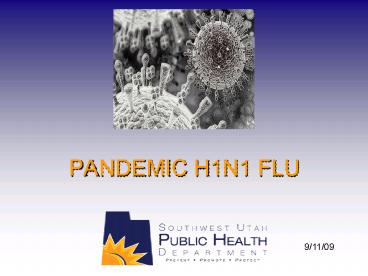PANDEMIC H1N1 FLU - PowerPoint PPT Presentation
1 / 32
Title:
PANDEMIC H1N1 FLU
Description:
'Our mission is to protect the community's health through the promotion of ... Body aches. Runny nose. Sore throat. Headache. Some report diarrhea and vomiting. ... – PowerPoint PPT presentation
Number of Views:60
Avg rating:3.0/5.0
Title: PANDEMIC H1N1 FLU
1
PANDEMIC H1N1 FLU
9/11/09
2
What is Public Health?
- Our mission is to protect the communitys health
through the promotion of wellness and the
prevention of disease.
3
What We Do
- Environmental Health (air, food, water)
- Immunizations (all ages, school, travel)
- Other Clinical Services (WIC, Baby Your Baby,
breastfeeding education, etc.) - Chronic Disease/ Injury Prevention
- Infectious Disease Tracking/Prevention
- Bioterrorism and Emergency Response
- Vital Records
4
Who We Serve
- Five Counties Washington, Iron, Kane, Beaver,
Garfield - 225,000 Residents
- With 62 employees
- Our website www.swuhealth.org
5
Influenza Virus
6
How the Flu Virus Changes
- Influenza viruses are prone to genetic change
- Antigenic drift (small mutation)
- Antigenic shift (drastic new mutation)
7
What is Seasonal Influenza?
- Annual seasonal epidemics
- 5-20 of population ill
- 20-40,000 deaths in U.S. annually
- Greatest effect on very young and older adults
- Result of antigenic drift
8
Influenza-associated Hospitalizations Utah
2005-2006
- Date as of March 1, 2006
9
Seasonal Flu Vaccine
- Available now at your local health department
- Flu Shoot Out Saturday, September 26th
10
What is H1N1?
- Also known as
- Novel Influenza A (H1N1)
- 2009 Pandemic Flu
- Swine Flu
11
(No Transcript)
12
How is pandemic influenza spread between humans?
- Droplet spread coughing, sneezing and
talking - If deposited in mouth, nose, eyes it can
infect others - Virus active on hard surfaces from 8 to 48 hours
13
What to watch forSudden onset of symptoms
- Fever 101 or higher
- Cough
- Fatigue/weakness
- Chills
- Body aches
- Runny nose
- Sore throat
- Headache
- Some report diarrhea and vomiting.
14
Why H1N1 is Unique
- No immunity
- Rapid spread (6 weeks vs. 6 months)
- Active through summer
- Recent/current flulikely H1N1 (90)
- Likely increase in the fall
- Pregnant women and people ages 15-55 most
affected
15
H1N1 U.S. Deaths by Age
SOURCECDC
16
The Good News
- Most people are recovering with no medical
intervention within 1 week of symptoms. - Anti-virals (Tamiflu) are effective.
- An H1N1 vaccine has been developed.
- Elderly people are not experiencing as much
illness as the rest of the population.
17
Latest H1N1 update
- Worldwide 277,607 cases, 3205 deaths
- U.S. 9079 hospitalized, 583 deaths
- Utah - 302 hospitalized cases, 18 deaths
- Southwest 8 hospitalized, 1 death
- (Actual cases are higher)
- Updated 9/11/09
18
Pandemic Phase 6 / Category 2
- World Health Organization estimates
- 30 - 40 of population will become ill
- .1-.5 Mortality Rate
- Similar to 1957 Pandemic
19
Will History Repeat Itself?
The 3 Waves of the 1918 Pandemic
20
What is Southwest Utah Public Health Department
Doing?
- Education
- Surveillance
- Working with state health officials
- Working with community partners hospitals, EMS,
first responders, funeral directors, elected
officials, schools, businesses, and churches - Anti-viral medication planning
- Vaccine planning
21
Preventing the Flu What Can I
Do?
- Boost your immune system
- Eat healthy
- Exercise
- Get plenty of rest
- Lower stress
- Get vaccinated
- Dont touch your face
22
What Can I Do?
- Wash hands often and properly for at least 20
seconds - Hand Sanitizer is also effective
23
What Can I Do?
- Cover cough or sneeze properly
- Cough into your sleeve
24
What Can I Do?
- Stay home if you are ill. Do not return to work
or school until fever is gone for 24 hours when
not taking fever reducing medication .
25
What Can I Do?
- Wipe down surfaces with disinfectant
Available commercially or mix ¼ cup household
bleach with 1 gallon of water .
26
What Can I Do?
- Avoid close contact with infected persons
- Avoid touching your face
- Mucus Membranes
- Eyes
- Nose
- Mouth
27
What Can I Do?
- Get both influenza vaccines
- Seasonal flu shot protects against 3 different
seasonal flu strains. (September 26th Shoot-Out!) - H1N1 flu shot Available soon. Will be
prioritized to vulnerable populations at first.
28
What Can I Do?
- Pandemic Preparedness
- Stay informed local, state national news
- H1N1 Update at www.swuhealth.org
- Have contingency plans for you and your family in
case there are school, church, or work closures.
29
What Can I Do?
- Have a family plan that includes food, medical
supplies, and other basics in case you cant get
to the store or need to shelter at home for a
period of time. - Learn how to treat the flu at home (Flu Kit).
Dont go to the hospital unless you are severely
ill. - Get involved with preparedness efforts in your
community and place of employment.
30
RESOURCES
- Visit www.swuhealth.org to find
- Flu Kit (treating flu at home)
- Stay At Home Toolkit (more comprehensive)
- Plan 9 (short-term preparedness)
- Family Emergency Preparedness Guide
31
Dont be scaredBE PREPARED!
32
Questions?































